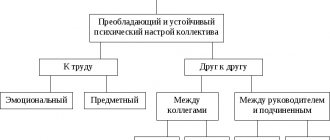There is a definition of personal effectiveness, which implies a person’s ability to most quickly and efficiently perform certain tasks and achieve their goals. This takes into account the time spent on execution and the amount of energy consumed. In essence, personal effectiveness is the correctness in choosing actions, managing one’s actions over a certain period of time, and most importantly, managing oneself. Despite the fact that the concept of time is static, and it is believed that it cannot be controlled, there is an option to correctly distribute your personal resources in order to spend as little time as possible on achieving a certain goal.
Personal effectiveness
Content
- What is personal effectiveness
- Why is it important to evaluate and improve personal effectiveness?
- Who is recommended to increase personal effectiveness first?
- When personal effectiveness is formed
- The basis of personal effectiveness
- Methods for increasing personal effectiveness
- Planning
- Prioritization
- Concentration of attention
- Gradually giving up gadgets at work
- Limiting time spent on social networks
- Monitoring your well-being
- Entering Flow State
- Know how to rest
- Stop overworking
- Learn to delegate authority
- Laziness and fear of change as obstacles to success
- Personal effectiveness and self-education
- Personal effectiveness and comfort zone
- Personal effectiveness in the company
- Conclusion
Clarity
We are often faced with a choice: how best to act in some situation. Continue receiving higher education or get a job and devote all your energy to your career. Choose a job with higher earnings or one that will give you more chances for growth.
When you find yourself at a crossroads, you need to understand what you prefer most . To do this, you need to analyze the choices you have already made before. Determine in advance those values and beliefs that are closer to your true self.
You need to identify your strengths and weaknesses. Your personality is built on their basis. Before you talk about yourself, you need to clearly define your main features.
Clarity makes you confident. And confidence in your qualities is the root of your personal effectiveness. Therefore, try to understand your own values, beliefs and personal principles.
❷
What is personal effectiveness
Let's start with the theoretical part. The very concept of personal effectiveness for the average person is understandable, but somewhat vague. Due to the fact that there is no clear definition, problems arise in the methodology, and in general in the field of application. Let's try to define a person's personal effectiveness.
Personal efficiency is a person’s ability to perform certain tasks as quickly and efficiently as possible.
Based on this definition, it is already possible to identify the main problems that a person faces when performing certain everyday tasks:
- Switching attention;
- Not working at full capacity.
That is, we can say that personal effectiveness implies a clear concentration on performing a specific task at the maximum level. Today, psychologists are increasingly giving priority to issues of personal effectiveness. In a world full of information, it is quite difficult not to drown in such a flow and filter out what you need.
What does it consist of?
The main components from which personal effectiveness is built are motivation, self-discipline, developing habits and critical analysis of one’s actions.
Motivation is the driving force of any activity. By setting goals, we understand what we need and start moving in the right direction.
Self-discipline is the ability to force yourself to act, regardless of distractions (mood, minor problems, etc.).
Useful habits are fixed ways of behavior, thanks to which activities are carried out fruitfully.
Critical analysis is the process of weighing information and one's actions in accordance with the criteria of reliability, quality and personal principles.
Important! Personal effectiveness depends on:
- The degree of awareness of your intentions.
- Accurately allocated resources.
- Correctly formed conditions for achieving goals.
Why is it important to evaluate and improve personal effectiveness?
The effectiveness of one specific person can influence not only the performance of one specific task at work or school, but also the overall pursuit of certain human goals.
Based on personal effectiveness, we can judge not only how quickly you complete the task assigned by your employer, but also how quickly you can climb the career ladder, receive and use new information, and achieve your goals.
Personal effectiveness is responsible for an important parameter – performance. A person with little effectiveness will endlessly trail behind while more successful ones use their potential to complete their tasks. In order to better understand the very meaning of using personal effectiveness, you need to raise the topic of talent and using your potential.
It is a well-known fact that success consists of hard work and talent. Moreover, people put forward different proportions, from 10% talent and 90% labor, to 50/50.
Personal efficiency is an analogue of work using your talent. That is, you use your resources to achieve your goal as quickly as possible, using the minimum possible amount of effort.
This does not mean that the task will be performed poorly; on the contrary, the more efficient a person is, the more efficiently he will complete the work in a short time.
Accordingly, increasing personal efficiency will inevitably lead to the fact that a person will spend much less time on everyday activities.
Example: an employee is tasked with analyzing competitors in his company's industry. Based on this report, he will need to make his analysis, assess the company’s development prospects and, in general, give his verdict on the advisability of entering the market. An employee will cope with this task from 1 week to 1 month. And the higher its efficiency, the shorter the time it will take to complete this task.
We talk more about the timing of tasks rather than their quality, primarily based on modern realities. The problem of the current job is not to cope with the task at the level - there are almost never problems with this. The main problem is the rational use of personal time.
Everyone has noticed this phenomenon: for the first 20-30 minutes at work, you, with burning eyes, begin to carry out the tasks assigned to you. Then, the effectiveness drops, the eyes stop burning, and what took 5 minutes gradually takes 10, 15 and 20.
If you look at yourself from the outside at this time, you can notice endless distractions, weakening concentration, switching from one task to another and other truly ineffective things. And this phenomenon is observed everywhere, not only at work, but also at school, when running your business, training, reading, etc.
It is in order to reduce the time it takes to complete one task, thereby increasing your productivity, that you need to train personal efficiency.
Constant self-development
Even the same action can always be performed in different ways. Advertising agencies come up with new ideas for promoting the same product over and over again.
Pepsi or Coca-Cola keep coming up with new methods to sell their product.
Top companies annually introduce new strategies to improve the personal effectiveness of employees. All processes continue to develop and accelerate . We need to accelerate even faster. Don't miss the opportunity to develop.
From a small push-button telephone to advanced touchscreen smartphones. From huge computers to ultra-thin MacBooks.
Look around you, change is everywhere. Therefore, this inevitably concerns you personally. Evolution affects both living and non-living objects. Everything develops, and humans are no exception. You need to develop both your physical skills and abilities, as well as your internal qualities, and master new knowledge.
As you age each year, some vital changes occur on a mental level. You learn new knowledge, you find new ways to communicate effectively with people, you learn new facts, you experience new problems.
To a certain extent, you develop naturally, and after that you must make a conscious effort to improve your old, practiced skills and abilities.
Travel, read, indulge in new hobbies. Be active and strive for change .
❼
Who is recommended to increase personal effectiveness first?
Absolutely every person needs to train personal effectiveness, but some professions require a special approach to this. Let's figure out who needs to take care of themselves first and foremost.
Freelancers. Let's start with them. This is a special category of workers who earn money on the Internet by performing various tasks. This could be the creation of programs, websites, texts, design, accounting, etc.
This category of people is most susceptible to information attack due to constant contact with information. If at work in the office social networks, news sites and other ways to kill time and distract from work are blocked or under surveillance, then when working from home there are no such restrictions.
Often, in order to complete a task that would take a maximum of 15 minutes, the average freelancer spends more than an hour. It is in order to cope with work faster, increase earnings, the number of clients, and at the same time free up time for more interesting things - freelancers need to constantly improve their personal effectiveness.
Businessmen. This category will include everyone who has their own business, as well as directors and top managers of large companies. In the realities of the modern economy, businessmen and senior management have a very limited amount of time to solve important problems.
Moreover, they have more responsibilities than ordinary employees. It is in order to find time for everything, and leave a few more hours for life outside of work, that you need to develop your personal effectiveness.
Students. Anyone who learns something can be included in this category. Regardless of whether it is school or a two-month accounting course, using their academic potential to the full is the primary task of these people.
Getting the maximum amount of useful information, filtering it from unnecessary garbage, and making it suitable for use for your own purposes is a task that is influenced by personal effectiveness.
Don't get distracted by little things
So, the mobile phone was turned off, they decided to look at the email after twelve... But there were still distractions. For example, smoking or talking with employees. So, it’s generally better to part with cigarettes, and headphones with quiet music will save you from unnecessary conversations.
If you have a separate office at your disposal, lock yourself for a couple of hours and thus save yourself from uninvited guests who want to drink coffee and chat with you. But if you work remotely and your office is a corner in the living room or bedroom, warn your household not to disturb you.
When personal effectiveness is formed
A person’s personal effectiveness is a subjective factor. It begins to form in preschool age, and its peak formation occurs at the age of 19-25, a time when people are just starting to work, using everything they received during their education.
But the whole foundation is acquired at school, when the same multitasking of students manifests itself: they need to do their homework, do what they like, surf on social networks, hang out with friends, complete their parents’ tasks around the house, and so on. It is during this period that priorities are set.
But this does not mean that increasing personal effectiveness is impossible at a later age. It is after 23-25 years that people think about how they can increase their efficiency in order to start earning more, devote time to their family and leave a little for their hobbies.
That is why it is necessary to improve one’s own effectiveness as early as possible, but even at a later age one cannot say that a person will not be able to change himself and begin to be more efficient.
Finding motivation
Without motivation, it is difficult to expect success in any endeavor. You need to love what you do - that’s our main motivator. However, sometimes it is not enough. Many experience unmotivated declines in activity, seasonal periods of low mood, and physical fatigue. This is fine. The body cannot function like an automaton. Sometimes we need a recharge. And here everyone must find out for themselves what exactly helps them restore productive performance.
For example, one coach shared on the Internet his way of keeping himself in good shape. He swims for an hour in the pool two to three times a week. After the lesson, you feel full of energy, refreshed, physically and emotionally ready for difficult work.
The same psychologist advises that whenever you feel that the inner fire is about to go out, ask yourself: why are you doing this work? What will you get from it? The work may be routine, but the results are motivating. Imagine it, visualize it, and things will go.
In general, as it turns out, physical activity and dancing help a lot of people, as they say, to keep their backs up. Music puts some people in the mood for work.
Proper nutrition is also very important. If you snack on cookies, chocolate and other fast food all day, then your nervous system is exhausted and your motivation disappears somewhere. Therefore, we increase our functionality with healthy food: we take cereal, nuts, fruits, and lean meat with us to work. We drink green tea and water.
We also learn to forget about work at home. The brain and nervous system need proper rest, that is, switching to books, movies, communication with loved ones and friends. And then every day you will be ready to implement your Napoleonic plans with even greater zeal.
The basis of personal effectiveness
The basis of personal effectiveness is made up of three factors:
- Setting goals;
- Resource usage;
- Socialization.
Setting goals is the most important factor of all three. In order to work effectively, you need to understand why you are doing it. A well-set goal is the basis of the result. At the same time, it is important to set intermediate goals. The shortest time period for one goal should be 1 day.
Resource usage . Comparing personal effectiveness with the economy is a great fit here. Economics is the science of using a limited amount of resources to satisfy needs. If we draw an analogy with a person, then everyone has their own supply of resources that must be used in order to fulfill their goals.
Socialization . Also quite an important factor. He is responsible for communication and implementation of goals in society. Every day a person inevitably encounters other people, and they also influence the fulfillment of his goals, just like himself.
It is in order to train the skill of achieving goals that you need to learn to build relationships with people and make sure that they help achieve goals in one way or another.
A person who wishes to develop his personal effectiveness must move in these three directions:
- Learn to correctly set your goals;
- Try to use your resources more wisely to achieve them;
- Interact with people to implement your plans.
Concentration
The development of efficiency does not end there. After you have more or less planned this or that action, set priorities and were able to somehow mentally tune in to the implementation of the task, you will have to work on concentration. Every time you start something, pay attention only to this activity, do not be distracted.
There are many temptations and distractions in the world. All this adversely affects the bottom line and efficiency. Therefore, it is advisable to concentrate on only one activity at a time. Don't try to keep up with two birds with one stone, thereby trying to save time. This approach will only complicate implementation.
It is for this reason that it is important to create a suitable and favorable environment for yourself during the implementation of the task. It will help your concentration. And, of course, it will affect efficiency.
Methods for increasing personal effectiveness
There are a lot of methods for increasing personal effectiveness, but they all say about the same thing. We have collected for you the 10 most popular ways to increase personal efficiency, and by following at least half of them for several months, you are guaranteed to notice an increase in your performance.
Planning
One of the most important ways to increase efficiency is to plan your day wisely. This is one of the main skills that can increase your performance throughout the day.
Abraham Lincoln was a truly brilliant man who was able to achieve the most ambitious goals only through his personal effectiveness. He worked to the maximum almost always, and this distinguished him from everyone who stood in the way of achieving his goals.
Working according to your goal is the primary area that you will have to work with first. It is best to write down your goals on plain paper - this makes them more tangible. It’s best to carry a goal journal with you and look at it periodically.
But plans for the day are just the tip of the iceberg. Goals should also be set for longer periods. Also, a person should have one goal - a mission that he should align himself with. This is usually a big and ambitious goal that can take almost a lifetime to achieve.
At the same time, drawing up a competent mission is the first step to becoming effective.
It is also advisable to carry a sheet of paper with your main goals and mission with you. It will help answer the question: “Why am I doing this at the moment,” and will also provide additional motivation for work.
Prioritization
Prioritizing is an important skill to learn as soon as you learn how to set your goals. Prioritize – decide which task should be completed first and which task should be completed after. Arranging such a sequence allows you to solve the most important tasks at the beginning of the day using maximum resources, leaving less effort for unimportant ones.
Mark Twain said: “If you eat a frog at the beginning of the day, the rest of the day promises to be wonderful. After all, you have already done all the hardest things.”
That is, you need to complete one large and complex task at once, without putting it off for a long time. After this, everything else will not seem so difficult and you will be able to complete everything without much effort.
Psychologists also share a similar point of view. After completing a difficult task, a person experiences a surge of endorphins - the hormone of joy, and as a result - an increase in the internal supply of resources. That is, after a difficult task, you will happily take on something less difficult. At the same time, the most enjoyable task should be left for the end. Striving for it will also increase your performance.
Prioritization allows you to choose the biggest and meanest frog, then the slightly smaller frog, and so on.
Concentration of attention
One of the most complex methods that allows you to accelerate personal effectiveness to the maximum.
Concentration is the ability to focus on something specific. That is, when completing a task, you are not distracted by extraneous things, completely devote yourself to the work and complete it much faster.
The problem of concentration today is one of the most pressing issues that psychologists attach importance to.
Some statistics:
- The average length of time a child concentrates on one thing is 7 minutes. For an adult, this figure can increase to 40 minutes.
- After 40 minutes of the same type of work, no matter how creative it is, a loss of concentration and a decline in performance occurs. This has a negative impact on personal effectiveness.
Today there are several methods for improving concentration, but the principle is the same: you need to periodically take breaks and, after long periods of doing the same thing, change your field of activity. One of the oldest but most effective methods of maintaining concentration is the Pomodoro method.
The essence of the method is that you need to engage in one type of activity for 25 minutes and after that take a 5-minute rest. After you have done this Pomodoro cycle 4 times, you need to change the activity, even if the work was not completed. And after 1-2 cycles, return to it and finish the job.
There are many other methods that you can learn about online.
Gradually giving up gadgets at work
This follows from the previous paragraph. Mobile phones and tablets negatively affect concentration. They force a person to constantly be distracted by unnecessary information. Gadgets at work should only be used for communication.
Limiting time spent on social networks
Social networks are an ideal tool for reducing personal effectiveness. They take up a huge amount of time without bringing anything in return. In order to make good use of your personal and work time, you will need to limit yourself as much as possible in terms of social networks.
Spend as little time as possible on VKontakte or Odnoklassniki, and you will notice that you have much more opportunities to do what you really like.
Monitoring your well-being
Poor health is one of the reasons why a person cannot use his maximum potential. During illness, a person will be practically useless at work, since he will not be able to perform everyday tasks as quickly and efficiently as he did before.
Therefore, it should be remembered that sometimes it is much better to spend 1-2 days to finally recover than to work while sick for 1-2 weeks, thereby reducing your effectiveness.
It also doesn't hurt to relax well before starting work. A hot bath can be a great option for this. For lovers of oriental arts, meditation can be a real salvation. During it, the human body rests at an accelerated rate, and literally after 20 minutes of meditation, you will feel a real surge of strength.
Entering Flow State
Flow is the name of a rather interesting psychological state of a person, which is characterized by peak performance. In this state, a person is able to give his maximum, or even go beyond his own limits.
In order to enter the flow, you can use internal or external stimulants. Internal stimulants include everything that concerns a person’s personal motivation. External stimulants include everything that one way or another can make a person calm down and tune in to the desired mood.
Suitable for this:
- Suitable premises;
- Hot bath;
- Meditation.
With internal stimulants, things are a little more complicated. They are individual for each person, but they are similar in one thing - they cause a positive charge of emotions, which allows you to focus on one thing for a long time. They also relate to internal motivation. Just learn about your motivational levers, and you can easily influence yourself and enter a state of flow.
Know how to rest
This is one of the most important skills that most people have lost. As they say, in most dictionaries, rest is a change in activity. Therefore, you cannot relax by simply lying on the sofa. You need to do something different that uses your other muscles and abilities.
Changing the type of activity is something that you should learn in a short time. If you work with your hands, play chess, poker, force your brain to think. If your work involves mental work, everything is done exactly the opposite - you need to rest, taxing the body physically, without giving it much time to think.
There is a common misconception that people who work a lot on the computer can relax by surfing social networks. But this is far from true. Time spent at the computer negatively affects the eye muscles, as well as the brain, which is forced to filter huge flows of information.
Consequently, when you go to social networks, your eyes will still strain and your brain will still filter information. It would be better to devote time to physical exercise.
Stop overworking
This point relates to health, but it should be highlighted separately. Each person must clearly understand his limit - the amount of work performed, after which he will harm his body.
We know that the capabilities of the human body are quite large, and it is not uncommon to go beyond one’s own limits, especially when it comes to urgent and important work. But the consequences of such cases are not positive.
In order to competently refuse overtime, you just need to experimentally find out your redistribution - that state when nothing works out anymore, work goes 2-3 times slower, and physical fatigue simply throws you out of balance. And next time, when you reach a similar amount of work, you need to slow down and put it aside for a while, after resting.
Learn to delegate authority
This applies to a greater extent to employees in management positions. Most bosses, especially old-school bosses, try to do most of the company's work alone. And that's wrong. After all, a manager who is busy at an enterprise becomes a worker, but a worker who makes a decision will not become a manager.
That is why it is better to create a clear hierarchical structure, with freedom of choice for each link - to transfer part of the powers that rest with you to the rest, lower working links. This will allow you to relieve yourself and increase the efficiency of each individual link and employee.
The personal effectiveness of a leader is what the entire company rests on. The more efficiently its management team works, the more management decisions can be made, and the better the economic situation of the enterprise will be.
These are fairly simple methods that are known to almost every person. But their implementation may require a significant amount of time. To make the most of them, you need to make these methods your habits.
Laziness and fear of change as obstacles to success
Laziness is the proverbial engine of progress. In fact, this is one of the main brakes that prevents a person from moving on. Along with it comes fear. And for the most part, it is the fear of change.
A person is afraid that in a new environment he will lose stability. And stability for most modern people is one of the main aspects of a successful life.
At the same time, if laziness is something that can and should be fought against, and every person understands this, then the fear of change is almost insurmountable alone.
A great way to combat laziness is to develop the habits of successful people. One of the most important methods that you should follow in life is to watch what successful people do and bring it into your life.
Another popular excuse is age.
We will not focus special attention on this, we will just give a few examples of successful people who realized their ideas at a fairly advanced age:
- Suze Orman is one of the most famous American writers. She worked as a waitress until she was 30. Success came only after 40;
- Harrison Ford is a fairly famous director. Until the age of 30 he worked as a carpenter;
- JK Rowling is the author of the Harry Potter books. At 31, she was still living on welfare;
- Ray Kroc is the current owner of the McDonald's chain. Until the age of 52 he worked as a traveling salesman;
- Henry Ford - no need to explain who he is. Only at the age of 40 did he manage to launch his first automobile plant.
And there are hundreds and thousands of such examples around the world. That very figure - 30 years, after which a person becomes so difficult to climb, according to statistics remains just a number. It's never too late to start moving forward.
Of course, age makes people’s brains less pliable, information becomes more difficult to assimilate, and new skills are acquired with great difficulty. True, there is one thing. This will be typical for those who simply stopped developing after graduating from school/institute.
If a person pays attention to his personal development, studies new information, learns about new issues that interest him, then with 100% probability his brain will work no worse than in school until he is 50-70 years old.
It is no coincidence that we touched on the issue of success. After all, the majority of readers who opened this article expect that increasing personal effectiveness will lead them to success.
And in most cases, the criteria for success are: financial well-being, good health and family. It is personal effectiveness that is responsible for a person’s path to success. The more effectively you use your internal resources, the greater your chances of being among truly successful people.
Personal effectiveness and self-education
Here we need to touch on the issue of education and self-education. Let's start with the fact that many people in their lives have thought more than once about personal effectiveness, although they called it by different words.
They read quite a lot on the Internet and bought various books on the topic of how to become rich, famous and successful. And a fairly vivid illustration of all such literature will be the work of Evgeny Gordeev - “how to make a million.” The book consists of 200 pages, 100 of which are taken up by the endless repetition of the word “work”, and the remaining 100 are lined out according to the plan. This is the most truthful book about how to become a successful and rich person.
That is, you need to understand once that there is no such magic pill that will suddenly make you successful and rich. You need to develop, and one of the main directions is to maximize your own effectiveness. From childhood, people are surrounded by useless knowledge without being taught the most important thing - how to set goals, use their own resources and achieve them. That is why the first thing you must learn if you want success is to use your own resources.
Getting ready for work
There is a direct relationship between order in the workplace and labor efficiency. Only people of creative professions can create in an environment of chaos, among a clutter of things, and even then not all of them.
It is difficult to explain, but the cleanliness and neatness of the “habitat” enlightens the mind and sets the thought process in motion. Therefore, always before work, take a look at your office or desk, remove everything unnecessary, wipe off the dust, ventilate the room and get down to business.
Personal effectiveness and comfort zone
The title of another book speaks about how to deal with your comfort zone – “Get Out of Your Comfort Zone. Change your life. 21 methods for increasing personal effectiveness" from Brian Tracy. In order to increase your personal effectiveness, you will need to get out of your comfort zone and into the real world as early as possible.
A person cannot achieve the maximum if he remains stagnant. Of course, your comfort zone is what makes you truly calm and even happy. At the same time, you are marking time and not achieving more.
Successful people never remained in their comfort zone, they endlessly moved forward. A striking example is the founder of the Virgin brand, Richard Branson. A person who has chosen 7 types of activities for his company and continues to expand his business.
Of course, leaving your comfort zone comes with challenges. First of all, it is the fear of failure. The second obstacle is laziness. Third, the wrong environment. All three of these factors negatively affect personal effectiveness, preventing you from using your full potential. It is in order to do your best, set ambitious goals and achieve them, you need to use methods to increase efficiency, implement them in your life and increase your performance to the maximum.
Spiritual improvement
Your inner world is what determines your self-improvement, since it is much broader than the outer one. Inner harmony, calmness, self-confidence are qualities necessary for an effective personality.
Your inner core is what will allow you not to lose heart in any situation, so it is very important to strengthen it.
Various techniques, such as yoga, meditation, singing, and breathing exercises, help to achieve peace. Try to analyze your thoughts and emotions to understand the reasons for your actions.
To know yourself better, you must become one with your own energy. Having understood your essence, you will become stronger and more confident, and any difficulties will only be an obstacle on the way to your goal.
❿
Personal effectiveness in the company
From the personal effectiveness of an individual, let's move on to an entire company or enterprise.
The effectiveness of company employees is no longer a matter of psychology, but of competent management. That is why a good leader must work in several areas at once - study applied psychology (methods of influencing people) and know the basics of management. This combination will allow you to competently manage people and push them in the right direction.
The methodology for improving employee effectiveness is not very different from the personal effectiveness of an individual. At the same time, it will be necessary to build a competent motivational system at work, which will allow you to reward effective workers and somehow influence those who do not work at their maximum.
Motivational systems can be completely different - from monetary (which is not effective enough) to ideological (the most effective).
Let's consider two extremes: motivation by money and ideological motivation. You can motivate with money for successful completion of work, or for exceeding the plan. But there is a significant drawback - for some workers, money is not the main motivation, and perhaps they do not go to work because of it.
Ideological motivation is the ability to inspire your employees in such a way that they are imbued with the idea of the company and independently come to the conclusion: they need to work to the maximum to help their employer achieve its goals. This is a rather complex, but interesting method that minimizes the cost of monetary rewards, but increases the efficiency of workers.
But it is almost impossible to find two such methods of motivation in their pure form. Therefore, employers have to combine several approaches: giving bonuses to particularly distinguished employees, and declaring their high-profile goals at general meetings.
A small life hack for businessmen: a competent mission statement is a great way to motivate employees. The larger, more interesting and “whiter” the company’s mission is, the more employees are willing to believe in it and give it their all.
In addition to the mission, a great way to motivate staff is to lead by example. The story of top manager Lee Iacocca deserves attention in this regard. This top manager took it upon himself to pull Chrysler out of the crisis. And to show all employees that he is part of the team, he set himself a salary of $1 per annum.
These are, of course, extremes, and this method has long been popular and is already somewhat hackneyed. But the main principle is clear: if you want to inspire your people to do their best, show them how to do it.
No gadgets
A little advice to help you achieve success. True, it is more suitable for modern users who are forced to work and concentrate in an atmosphere of constant temptations in the form of technology and information technology. What are we talking about?
If you want to achieve maximum success in a particular task, but require concentration, put all gadgets away. Turn off your phones to avoid distractions, stay away from the computer, and don’t pick up tablets or game consoles. If you really need to, use technology only when it is necessary to complete your task. And then only in this direction. Entertainment and relaxation are good, but gadgets and technology usually only serve as distractions.











